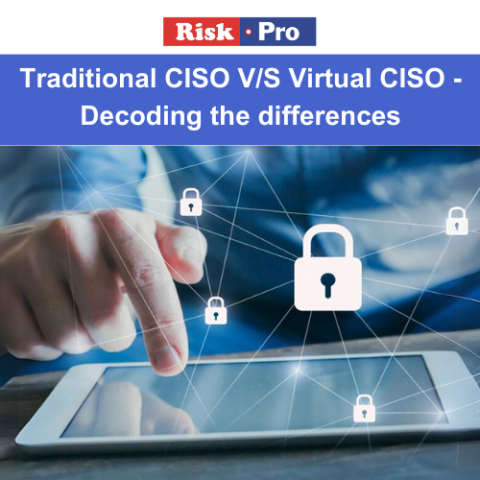
How Does a vCISO Differ From a CISO?
At the forefront of this vital domain are two key roles: vCISO and CISO. These perspectives, while having the same purpose of protecting information, differ greatly in their strategy and execution. Understanding the subtleties of these positions is vital for recognizing how they strengthen an organization's security structure.
-
The cost difference between the two models
Hiring a full-time, in-house CISO can be costly, especially for small and medium-sized companies. In addition to a high compensation, CISOs may be offered benefits like as health insurance, retirement programs, and stock options.
In contrast, vCISOs often charge a lower hourly cost or retainer price than a full-time CISO.
-
Level of involvement and scope of responsibilities
Traditional CISOs are often in charge of establishing and implementing a complete cybersecurity strategy, supervising security operations, and ensuring compliance with regulations.
In contrast, vCISOs can be more flexible in terms of their involvement and scope of responsibilities. They may offer strategic advice, aid with compliance, conduct risk assessments, and make recommendations for security improvements.
-
The flexibility of the vCISO model compared to traditional CISO
Traditional CISOs are often in charge of establishing and implementing a complete cybersecurity strategy, managing the security team, supervising security operations, and ensuring compliance with regulations.
In contrast, vCISOs can be more flexible in terms of their involvement and scope of responsibilities. They may offer strategic advice, aid with compliance, conduct risk assessments, and make recommendations for security improvements.
-
Time Commitment
Traditional CISO: The CISO dedicates all of their time to the organization and is available throughout regular business hours. They are more likely to be actively involved in daily activities.
VCISO: Virtual CISOs may work part-time, providing strategic counsel and conducting periodic assessments. They may not always be available on-site, but they can provide crucial feedback during critical times.
Role of a CISO :-
One of a CISO's key roles is to create and implement cybersecurity rules and procedures. By doing so, they ensure that all workers understand their roles and duties in protecting the organization's data. This includes installing access limits, encryption, and frequent security awareness training.
Furthermore, a CISO is responsible for designing and implementing a long-term cybersecurity roadmap that is consistent with the overall business strategy. They collaborate closely with other stakeholders, including IT teams and executives, to foster a culture of security awareness and ongoing development. This includes reviewing the organization's present security posture, identifying vulnerabilities, and establishing risk-mitigation policies.
When you need a CISO ?
Should you employ a virtual CISO or a full-time, in-house CSO? When is it worthwhile to hire a vCISO? Getting solutions to this question may seem tough. The following are some of the instances where it would be a good idea to hire a vCISO:
- There are budget constraints in the organization.
You can employ a virtual CISO for a fraction of the cost. You can also hire someone remotely, which reduces prices even further.
- The organization is an SMB or a startup.
Small or medium-sized organizations or startups may not require the services of a full-time chief information security officer. However, they may go for a vCISOs who may be an appropriate alternative in this situation who can assist you establish the groundwork for information security best practices.
- The organization is going through rapid growth or changes.
When an organization is going through changes would need a leader with decision-making capabilities to interweave information security in the business strategy. A vCISO can help achieve this on an ad-hoc basis.
4. The organization requires additional support to improve its security posture.
A virtual CISO can also help improve an organization's security culture. They can lead campaigns to raise staff awareness and education about security issues.
What is Adaptive Security?
Adaptive security is a cybersecurity method that enables your Security Operations Center (SOC) to immediately respond to the most recent attacks.
By implementing adaptive security, your company can review and analyze behaviors and occurrences in real time, allowing it to take preventative measures before a breach occurs.
How to Implement Adaptive Security -
In the context of a Chief Information Security Officer (CISO), adaptive security techniques include proactive measures for anticipating, detecting, and responding to emerging hazards.
A cyclical, dynamic approach to cybersecurity with four major stages. Here are some real-world examples of each:
- Predict: Proactively identify potential dangers by assessing risk and anticipating attack vectors.
- Prevent: Implement efforts to reduce susceptibility and prevent issues before they happen.
- Respond: Address and limit the effect of security incidents once they occur.
- Defect: Maintain continuing compliance with security rules and regulations, and address any flaws in security procedures.
Full time Employee v/s Vciso
Onboarding any employee costs investment and increases your overhead. Although you may locate a well-qualified CISO who appears to be ideal, there are some drawbacks. This is a comparison, thus we must consider the benefits and drawbacks of hiring an FTE against a vCISO.
Conclusion :
When picking between a vCISO and a CISO, there is no one-size-fits-all solution. The decision is ultimately determined by your organization's specific demands, resources, and ambitions. Both choices provide essential experience and can greatly improve your cybersecurity posture.
If cost-effectiveness and access to different information are important aspects for your firm, a vCISO may be the best option. On the other hand, if you value constant leadership and influence inside your organization, a full-time CISO may be a better fit.
Finally, by carefully examining your organization's needs and weighing the benefits of each choice, you can make an informed decision that protects your data from ever-changing cyber threats.
To know more contact us at info@riskpro.in
